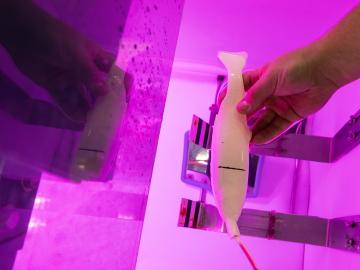
Filter News
Area of Research
- Advanced Manufacturing (24)
- Biology and Environment (71)
- Building Technologies (3)
- Computational Biology (1)
- Computational Engineering (3)
- Computer Science (15)
- Electricity and Smart Grid (1)
- Energy Science (207)
- Energy Sciences (1)
- Fuel Cycle Science and Technology (1)
- Functional Materials for Energy (1)
- Fusion and Fission (11)
- Fusion Energy (3)
- Isotope Development and Production (1)
- Isotopes (27)
- Materials (98)
- Materials for Computing (25)
- Mathematics (1)
- National Security (57)
- Neutron Science (38)
- Nuclear Science and Technology (16)
- Quantum information Science (8)
- Supercomputing (137)
- Transportation Systems (2)
News Topics
- (-) 3-D Printing/Advanced Manufacturing (146)
- (-) Computer Science (226)
- (-) Coronavirus (48)
- (-) Cybersecurity (35)
- (-) Frontier (64)
- (-) Isotopes (62)
- (-) Microscopy (56)
- (-) National Security (86)
- (-) Polymers (35)
- (-) Space Exploration (26)
- (-) Transportation (103)
- Advanced Reactors (40)
- Artificial Intelligence (131)
- Big Data (79)
- Bioenergy (112)
- Biology (128)
- Biomedical (73)
- Biotechnology (39)
- Buildings (74)
- Chemical Sciences (86)
- Clean Water (33)
- Composites (35)
- Critical Materials (29)
- Education (5)
- Element Discovery (1)
- Emergency (4)
- Energy Storage (114)
- Environment (218)
- Exascale Computing (67)
- Fossil Energy (8)
- Fusion (66)
- Grid (74)
- High-Performance Computing (130)
- Hydropower (12)
- Irradiation (3)
- ITER (9)
- Machine Learning (68)
- Materials (157)
- Materials Science (158)
- Mathematics (12)
- Mercury (12)
- Microelectronics (4)
- Molten Salt (10)
- Nanotechnology (64)
- Neutron Science (171)
- Nuclear Energy (122)
- Partnerships (68)
- Physics (69)
- Quantum Computing (53)
- Quantum Science (93)
- Security (31)
- Simulation (65)
- Software (1)
- Statistics (4)
- Summit (71)
Media Contacts

UT-Battelle, the managing contractor of Oak Ridge National Laboratory for the U.S. Department of Energy, has donated $10,000 to Second Harvest Food Bank of East Tennessee, providing 30,000 meals for those in need.

Hydropower developers must consider many factors when it comes time to license a new project or renew an existing one: How can environmental impacts be mitigated, including to fish populations?

Researchers at the Department of Energy’s Oak Ridge National Laboratory have used Summit, the world’s most powerful and smartest supercomputer, to identify 77 small-molecule drug compounds that might warrant further study in the fight

Biological membranes, such as the “walls” of most types of living cells, primarily consist of a double layer of lipids, or “lipid bilayer,” that forms the structure, and a variety of embedded and attached proteins with highly specialized functions, including proteins that rapidly and selectively transport ions and molecules in and out of the cell.

OAK RIDGE, Tenn., Feb. 27, 2020 — Researchers at Oak Ridge National Laboratory and the University of Tennessee achieved a rare look at the inner workings of polymer self-assembly at an oil-water interface to advance materials for neuromorphic computing and bio-inspired technologies.

Scientists at the Department of Energy’s Oak Ridge National Laboratory have developed a new method to peer deep into the nanostructure of biomaterials without damaging the sample. This novel technique can confirm structural features in starch, a carbohydrate important in biofuel production.

We have a data problem. Humanity is now generating more data than it can handle; more sensors, smartphones, and devices of all types are coming online every day and contributing to the ever-growing global dataset.

Each year, approximately 6 billion gallons of fuel are wasted as vehicles wait at stop lights or sit in dense traffic with engines idling, according to US Department of Energy estimates.

OAK RIDGE, Tenn., Feb. 19, 2020 — The U.S. Department of Energy’s Oak Ridge National Laboratory and the Tennessee Valley Authority have signed a memorandum of understanding to evaluate a new generation of flexible, cost-effective advanced nuclear reactors.

As the second-leading cause of death in the United States, cancer is a public health crisis that afflicts nearly one in two people during their lifetime.


